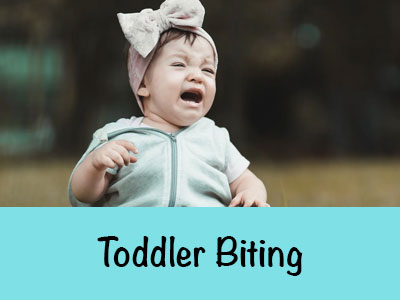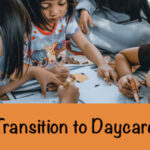Stopping Your Toddler from Biting
Many toddlers go through some baffling stages, and one of the top ones is biting. While resorting to biting seems quite bizarre to any adult, it’s actually developmentally appropriate for toddlers. As we assure you your child is quite normal, obviously biting isn’t a habit that can be ignored. Today we discuss getting to the route of why your toddler is biting and how to get them to stop.
Why is My Toddler Biting?
There are many reasons your toddler may be biting. It’s important to consider the entire scope of the incident before finding a solution. Ask yourself some questions before finding a solution:
- Is your child teething?
- Did they bite in retaliation to something ? (Ex: A toy was taken so they bit another child)
- How did they react after biting? (Did they laugh? Were they exploring cause and effect?)
- How were they doing emotionally when they started biting?
When you find all the details it’s easier to narrow down why they are biting and come up with an individual plan to prevent this behavior in the future.
Young Toddlers Biting: Curiosity
One of the first viral videos to go around on youtube years ago was “Charlie Bit My Finger”. A young preschooler puts his finger in his younger brothers mouth (Charlie), and Charlie inevitably bites down. As the older brother cries out, Charlie laughs.
As Charlie was quite young he is probably teething and still used to exploring the world with his mouth. He is probably curious and wonders what happens if he bites someones finger?
To stop young toddlers from biting it’s best to give a firm “No. No Biting” and redirecting the biting to teething toys or a cold washcloth. It can be harder for younger children to understand and they may hesitate before biting. Look for signs they are going to bite and try to redirect them before they do.
Older Toddlers Biting: Frustration
As toddlers get older if biting shows up it tends to be a lot more purposful than playful bites of an infant. Toddlers are not only learning to communicate, but how to interact with others. Unfortunately as kids all grow at their own rate their communication skills may not be effective.
Most often when a Toddler ends up biting it’s due to frustration. Frustration can be caused by two main reasons:
- Lack of ability to communicate needs with words
- At their limit: Hungry, Tired, Overwhelmed
Difficulty Communicating
Younger children may not have the words to communicate that they don’t want to share their toy or are frustrated that it was taken away. As they become frustrated they act impulsively the first way they can think of.
If your young one isn’t speaking yet you can try and be their interpreter and intervene before things get out of hand. Also consider introducing your child to Sign Language for them to communicate their needs. Many children understand their wants and needs long before they can verbally explain them. Sign Language helps them communicate and can lead to less tantrums.
Helping an Overwhelmed Child
Some children, especially older toddlers, may have the language skills needed but are overwhelmed and unable to access that part of their brain. When they are hungry, tired, or overstimulated (too many people/noises/ect) they may react in ways they don’t commonly do. Big feelings in general can overwhelm little ones.
To help a little one that is overwhelmed it’s best to pull them aside to calm down. Make sure the other child who was bitten is ok and provide aid as needed. Once your little one seems to be in a better head space it’s important to walk your child through the situation through calm communication.
Example: I saw she took your toy and that made you very angry, because you were enjoying playing with that toy. When we are angry we are not allowed to bite/hit/push others because you can hurt them. Next time someone takes a toy from you what could you do differently?
Future solutions on approaching the situation will vary depending on your childs age/abilities. They may need to ask an adult for help or if they are old enough they should learn to communicate their feelings verbally before lashing out physically.
Do’s and Don’ts of Dealing with a Biting Habit
If your little one seems to be biting often, you’ll need to be consistent for as long as the behaviour persists.
- DO: Keep an eye out for triggers for your childs biting. If they bite when they are overtired it’s time to head home from the park.
- DON’T: Overreact to biting each time it happens. It’s important to remain calm and in control. Even if this is the third time it’s happened, kids learn through repeated experience.
- DO: Make sure your response is age appropriate. As we mentioned before a young toddler may need to be redirected to a teething toy rather than a talk on feelings.
- DON’T: Continue to allow your child to play with the child they bit. Keep them seperated unless they both are interested in playing afterwards.
- DO: Provide proper communication tools or outlets for when they feel overwhelmed (Ex: Find another adult, Say “Stop” or “No”. Try role playing these situations at home.)
Keep Open Communication with Other Adults
If your child is struggling with behavioural issues it’s important to communicate and share strategies with other adults who will be watching your child. Try reaching out to your Daycare Teacher to discuss what you are working on at home with your child so approaches can be consistant. Teachers can provide a wealth of information and tips as well.
While frustrating, know that this stage will one day pass as well!
Kinder Buddies Oakville Child Care is a Quality First Daycare and Infant Care facility in Oakville, Ontario. We take care of children from the age of 6 weeks to 5 1/2 providing nutritious meals and fun activities all day long.


 Previous Post
Previous Post Next Post
Next Post